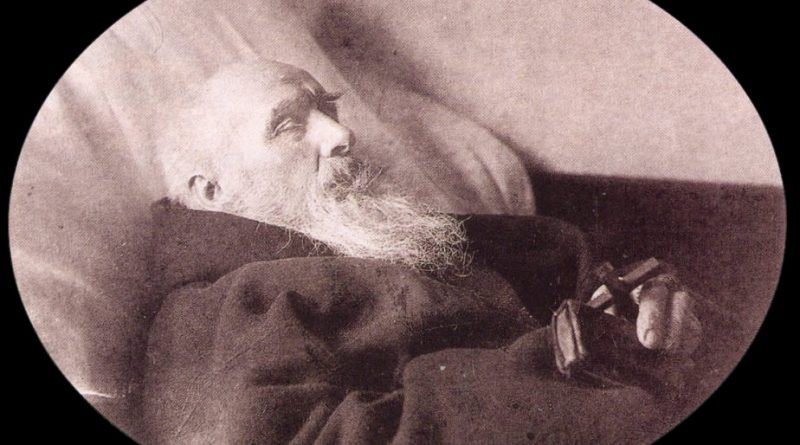St Conrad of Parzham
Today, Wednesday 2021, is the feast day of the Capuchin lay brother St Conrad of Parzham OFM Cap. This humble and hidden lay brother was sanctified by the Blessed Sacrament and his love for Mary. He was also a great Apostle of charity, miracle worker as well as having the gift of prophecy.
Conrad was born on 22 December 1818 at Parzham, Bavaria, Germany. His baptismal name was as Johann Birndorfer. He was the ninth son of a poor farming family. From his early years he gave evident signs of a deep interior life, preferring places of solitude where he could spend his time alone with God. Notwithstanding the great distance from the nearest Church, Conrad walked frequently through rain and snow to attend the holy Mass. He nourished a great devotion to Our Lady and prayed the Rosary daily with a fervent heart.
Conrad remained on the farm without much thought of the future. His mother died when he was only 14. At age 31, with the passing of his father, Conrad decided to follow his heart and become a Capuchin Franciscan. After giving away his possessions he was admitted to the novitiate as a lay brother and received the religious name Conrad. Immediately after his profession he was sent to the friary of St Ann, in the city of Altötting. The friary served the Shrine of Our Lady of Altötting, the National Shrine of Bavaria to the Blessed Mother.
Conrad was given the position of porter at this shrine and retained it until his death. Because it was a large and busy city, the duty of the friary porter was a very difficult one. Conrad was known to be diligent at his work, sparing in words, bountiful to the poor, eager and ready to receive and help strangers. Brother Conrad fulfilled the task of porter for more than forty years, assisting the inhabitants of the town in their needs of body and soul.
Conrad loved silence! As it has been said, he sought places of solitude as a child in order to raise his thoughts to God. During his spare moments as a porter, he would duck into a nook near the door where it was possible to see the Blessed Sacrament in the nearby chapel. During the night, he often deprived himself of hours of sleep in order to be alone with Jesus in the chapel. It was generally believed that he never took any rest but continually occupied himself in work and exercises of devotion. Conrad also continued his childhood devotion to Our Lady, deepening his love for the Mother of God with every year of his religious life. These were his great secrets to sanctity: Silence, the Blessed Sacrament and Mary, Queen of the Friars Minor.
During his lifetime, Brother Conrad was reputed to have been able to read the hearts of those he met and was attributed the gift of prophecy. His heroic virtues and the miracles attributed to his intercession earned for him the beatification by Pope Pius XI in 1930. Four years later, the same pope, approving additional miracles which had been performed, canonised him.
Personally speaking I have been touched by Conrad’s life goals which were documented in 11 resolutions he made after considerable thought in the novitiate, probably during the retreat before profession. They give us a clear picture of the kind of Capuchin Bro. Conrad intended to be:
1) I resolve in the first place to remain continually in the presence of God and to ask myself frequently if I would do this or that if my confessor or superior were watching me and especially if God and my guardian angel were present;
2) I resolve to ask myself, whenever I have to encounter crosses of suffering, “Conrad, why have you come here?”;
3) I resolve to avoid leaving the friary, as far as possible unless it be out of love for my neighbor, obedience, reasons of health, a pious pilgrimage or some other good cause;
4) I resolve to foster fraternal charity in myself and in others. Therefore I resolve to take care never to say an unkind word. I resolve to bear up patiently with the defects and weaknesses of others, and as far as possible to hide them with the mantle of charity unless I am in duty bound to manifest them to someone who is in a position to correct them;
5) I resolve to observe silence conscientiously. I resolve to speak briefly and so avoid many pitfalls and be better able to converse with God;
6) When at table, I resolve to place myself in the presence of God as far as I can, to remain recollected and to pass up my favorite dishes so as to practice a hidden form of mortification. I resolve not to eat between meals unless ordered to do so under obedience;
7) I resolve to answer the first call of the bell unless legitimately hindered;
8) I resolve to avoid, as far as possible, conversing with the opposite sex unless obedience imposes duties on me which make it necessary to speak with women. In that case I resolve to be very reserved and maintain custody of the eyes;
9) I resolve to carry out orders punctually and to the letter. I resolve especially to make every effort to conquer my own will in all things;
10) I resolve to force myself to pay close attention to minor details and as far as possible avoid every imperfection. I resolve to observe the holy rule faithfully and not to depart from it a hairsbreadth, come what may;
11) I resolve to cultivate a deep devotion to the Blessed Virgin Mary and strive to imitate her virtues.
Pope Pius XI said of St Conrad: In all this he manifested extraordinary diligence and prudence, wisdom, attention and tact. See what an important function a porter exercises in great palaces and hotels. The porter is everything, knows everything. Everybody turns to the porter with the assurance, even the right, to get a satisfactory answer to questions.
St Conrad of Parzham pray for us!
Fr Mario Attard OFM Cap





